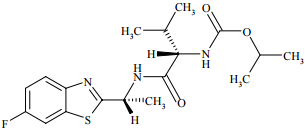Benthiavalicarb-isopropyl 苯噻菌胺
Introduction: Benthiavalicarb-isopropyl is a novel fungicide belonged to the carboxylic acid amides (CAA) group. This compound is a highly selective fungicide that has superb preventive and curative effects on late blight and downy mildew caused by plant pathogens that belong to Oomycetes. Benthiavalicarb-isopropyl strongly inhibits mycelia growth, zoosporangia germination and cystospore germination, and also inhibits the sporulation of Phytophthora infestans at a very low concentration. The fungicidal and disease-controlling activities of benthiavalicarb-isopropyl are characterized by its excellent preventive, curative, translaminar, systemic movement, residual activities, its inhibitory activity toward lesion development and its rain fastness. These results suggest that the biological properties of benthiavalicarb-isopropyl contribute to its excellent ability to control several diseases in the field.
Common name: Benthiavalicarb-isopropyl
Another name: UNII-AJ55PMS5IT; AJ55PMS5IT; CHEMBL2334743; CHEBI:81732; 1-Methylethyl [(1S)-1-[[[(1R)-1-(6-fluoro-2-benzothiazolyl)ethyl] amino]carbonyl]-2-methylpropyl]carbamate; isopropyl ((S)-1-{((1R)-1-(6-fluoro-1,3- benzothiazol-2-yl)ethyl)carbamoyl}-2-methylpropyl)carbamate; etc.
Chemical Name (IUPAC):
isopropyl [(S)-1-{[(1R)-1-(6-fluoro-1,3-benzothiazol-2-yl)ethyl]carbamoyl}-2- methylpropyl]carbamate
Structural formula:

Empirical formula: C18H24FN3O3S
Mol. Weight: 381.47
CAS No.: 177406-68-7
Specifications
Leading Benthiavalicarb-isopropyl supplier
Benthiavalicarb-isopropyl 95% TC
Benthiavalicarb-isopropyl 98% TC
Benthiavalicarb-isopropyl 15% WDG
Packing
BULK PACKING
Powder: 25KG/Bag, 25KG/Drum, 50KG/Drum etc.
Liquid: 200L/Drum, 20L/Drum, 10L/Drum ect.
SMALL PACKING
Powder: 1kg/Alu bag, 500g/Alu bag, 200g/Alu bag, 100g/Alu bag, 50g/Alu bag, 15g/Alu bag etc.
Liquid: 5L/Drum, 1L/Bottle, 500ml/Bottle, 250ml/Bottle, 100ml/Bottle, 50ml/Bottle etc.
Customerized Packing label
Benthiavalicarb-isopropyl FAO standard
Professional registration
HAZARDS IDENTIFICATION
Hazard statement(s)
H317 May cause an allergic skin reaction.
H319 Causes serious eye irritation.
H332 Harmful if inhaled.
H351 Suspected of causing cancer.
H400 Very toxic to aquatic life.
Precautionary statement(s)
P264 Wash hands thoroughly after handling.
P271 Do not eat, drink or smoke when using this product.
P272 Use only outdoors or in a well-ventilated area.
P302 + P352 IF ON SKIN: Wash with plenty of soap and water.
P501 Dispose of contents/container in accordance with local regulation.
Supplemental Hazard Statements none
MAMMALIAN TOXICOLOGY
Acute toxicity: 1) Acute oral LD50 for male and female rats is >5000 mg/kg. 2) Acute percutaneous LD50 for rats is >2000 mg/kg. 3) Acute inhalation toxicity LC50 (4 h) for rats is >4.6 mg/L. 4) Skin irritation: Non-irritating to skin (rabbits). 5) Eye irritation: Slightly irritating to eyes (rabbits). 6) Skin sensitization for guinea pig: Not a skin sensitiser.
NOEL (2 y) for male rats is 9.9 mg/kg/day, for female rats is 12.5 mg/kg/day; NOEL (90 d) for dogs is 40 mg/kg/day. Other Not mutagenic or not genotoxic.
ADI (JMPR) 0.1 mg/kg b.w.
Classification: EC Risk Classification: Carcinogen category 3: R40; N - Dangerous for the environment: R52, R53
ECOTOXICOLOGY
Effect on birds: Acute oral LD50 for Bobwhite quail is >2000 mg/kg. Short term dietary LD50 for Bobwhite quail is >937 mg/kg. Effect on fish: Acute LC50 (96 h) for Rainbow trout is >10 mg/l. Effects on aquatic invertebrates: Acute EC50 (48 h) for Daphnia magna is >10 mg/l. Effects on algae: Acute EC50 (72 h) for Pseudokirchneriella subcapitata is >10 mg/l. Effects on bees: Contact acute (48 h) LD50 is >100 μg/bee, Oral acute (48 h) LD50 is >100 μg/bee. Effects on earthworms: Acute 14 day LC50 is >500 mg/kg.
ENVIRONMENTAL FATE
Animals In rats, following oral administration, excretion was predominantly via the bile and virtually completed by 168 hours. The metabolism was complex; the predominant routes were glutathione conjugation, or hydroxylation on the benzene or the valyl moieties. Plants In plants, metabolism proceeds slowly. The major metabolites are similar to those in animals. Soil/Environment In the laboratory, benthiavalicarb-isopropyl was readily degraded in soil; DT50 11-19 d (20°C, aerobic), 40 d (20°C, anaerobic). Koc 121-258.
Usage: Benthiavalicarb-isopropyl was developed by Kumiai Chemical and Ihara Chemical. It is new fungicide active against Oomycetes fungal plant pathogens, control of diseases such as Blight, Downy mildew, in vegetables, potatoes, vines, tomatoes, grapes, etc.
Application: Biochemistry Proposed inhibitor of cell wall synthesis. Mode of action Protective and curative action with residual effects, inhibits phospholipid biosynthesis. Uses For use against downy mildew and late blight on vegetables, potatoes and grapes, at 25-75 g/ha.
| 






